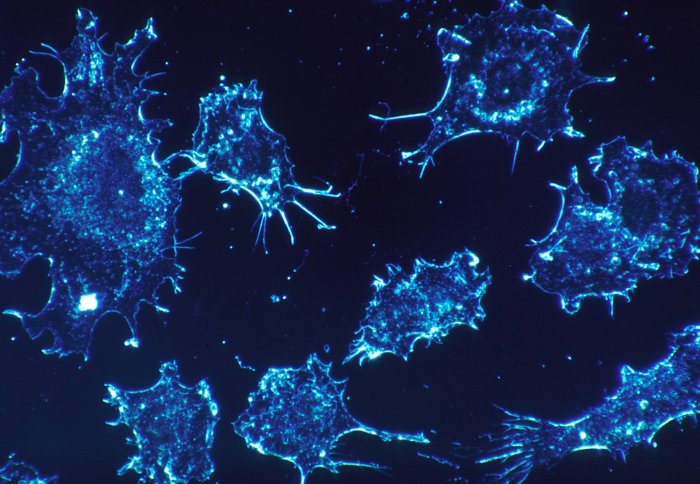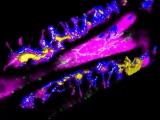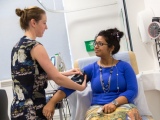Four ways Imperial is leading the fight against cancer

To coincide with World Cancer Day on 4 February, we look at how Imperial College London has been leading the fight against cancer in the past year.
1: Our research is revealing how lifestyle changes can reduce the risk of cancer
 An analysis of over 18,000 cases of cancer showed that people who eat 20g of nuts a day have a 15 percent reduced risk of developing the disease. Study coauthor Dr Dagfin Aune said: “Some nuts, particularly walnuts and pecan nuts are high in antioxidants, which can fight oxidative stress and possibly reduce cancer risk."
An analysis of over 18,000 cases of cancer showed that people who eat 20g of nuts a day have a 15 percent reduced risk of developing the disease. Study coauthor Dr Dagfin Aune said: “Some nuts, particularly walnuts and pecan nuts are high in antioxidants, which can fight oxidative stress and possibly reduce cancer risk."
Another meta-analysis, from June 2016, found that a higher intake of whole grains was associated with reduced risk of a range of diseases and death. It showed a 15 percent reduction in the relative risk of cancer, per 90g per day of whole grain products consumed.
2: We’re improving diagnosis and identifying the causes of cancer
In 2016 scientists from the Department of Surgery and Cancer developed a ‘robotic rectum’ that could help medical professionals detect prostate cancer. The idea is that the device helps train doctors and nurses to perform rectal examinations by accurately recreating the feel of a rectum, as well as providing feedback on their examination technique.
Professor George Hanna, Director of NIHR-Diagnostic Evidence Cooperative at Imperial, and his team have devised a breath test that can diagnose oesophageal cancer in minutes. Last February, he explained why the disease – now the 9th most common cancer in the UK – is on the rise.
Unemployment and reduced public-sector health spending following the 2008 crisis were associated with increased cancer mortality, according to a study from May 2016. The research, lead by Imperial, estimated that the recent economic crisis was associated with over 260,000 additional cancer deaths in countries within the Organisation for Economic Development by 2010, of which 160,000 were in the European Union.
3: New treatments are being developed, and existing ones refined
In March 2016, Imperial researchers revealed that a key molecule in breast and lung cancer cells can help switch off the cancers' ability to spread around the body. It is hoped that the findings may help researchers develop treatments that prevent cancer travelling around the body - or produce some kind of test that allows doctors to gauge how likely a cancer is to spread.
 Research from the Department of Life Sciences shed light on how leukaemia cells can survive cancer treatment, suggesting new possibilities for stopping them in their tracks. Counter to the popular theory that the cells hide within the bone marrow, and to the researchers’ surprise, the cells were scattered throughout the mouse bone marrow both before and after treatment, and they were moving around rapidly. “Ultimately we want to find out whether we can stop the movement, and whether this could kill the treatment-resistant cells”, said study leader Dr Cristina Lo Celso.
Research from the Department of Life Sciences shed light on how leukaemia cells can survive cancer treatment, suggesting new possibilities for stopping them in their tracks. Counter to the popular theory that the cells hide within the bone marrow, and to the researchers’ surprise, the cells were scattered throughout the mouse bone marrow both before and after treatment, and they were moving around rapidly. “Ultimately we want to find out whether we can stop the movement, and whether this could kill the treatment-resistant cells”, said study leader Dr Cristina Lo Celso.
Early-stage findings, from an international team led by Imperial and the European Institute of Oncology in Milan, last month revealed some breast tumours evolve to make their own 'fuel supply', rendering treatments powerless. The team, whose findings are published in the journal Nature Genetics, hope their work will increase treatment options for patients whose cancer has returned.
4: We're collaborating with world-class partners
Lifesaving cancer research and treatment centres at Imperial have received a further five years of funding from Cancer Research UK. The recent announcement from CRUK and its decision to re-invest in the Imperial CRUK Centre and the Imperial Experimental Cancer Medicine Centre (ECMC) reflects Imperial’s world-leading reputation for taking a co-ordinated effort to tackling cancer.
 In July 2016 The Royal Marsden NHS Foundation Trust and the Royal Brompton & Harefield NHS Foundation Trust joined the Imperial College AHSC. This brings together 21,500 clinicians and other NHS staff, researchers and academics to drive innovation and improved care for the direct benefit of over 1.1 million patients each year in North West London.
In July 2016 The Royal Marsden NHS Foundation Trust and the Royal Brompton & Harefield NHS Foundation Trust joined the Imperial College AHSC. This brings together 21,500 clinicians and other NHS staff, researchers and academics to drive innovation and improved care for the direct benefit of over 1.1 million patients each year in North West London.
May 2016 saw Imperial and the Institute of Cancer Research (ICR), announce a new joint research centre focused on tackling the disease. The Cancer Research Centre of Excellence will see academics and clinicians at the ICR and Imperial working together to deliver a world-leading programme of cancer research. It combines resources and infrastructure from both parties to help develop breakthrough cancer treatments, improve diagnosis, and find new ways to prevent the disease.
Article supporters
Article text (excluding photos or graphics) © Imperial College London.
Photos and graphics subject to third party copyright used with permission or © Imperial College London.
Reporter
Mr Al McCartney
Faculty of Medicine Centre